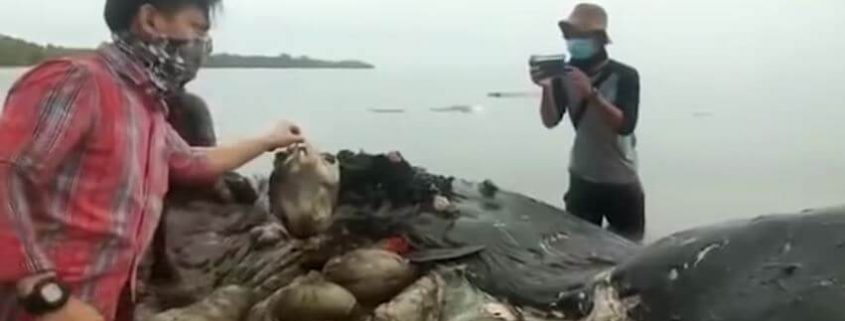Dead Whale Ingested Plastic Bottles, Bags, Flip-Flops, and 115 Cups
A dead sperm whale who washed ashore in Indonesia is yet another sad indictment of our plastic-pollution problem. The whale had ingested 13 pounds of plastic waste, including two flip-flops, four plastic bottles, 25 bags, and 115 cups.
The whale had also ingested more than 7 pounds of plastic string, which may have been discarded fishing equipment. According to the National Oceanic and Atmospheric Administration, “[M]ore than one million birds and 100,000 marine mammals die each year due to ingestion of, and entanglement in marine debris.”
National Geographic found that most of the Great Pacific Garbage Patch—the world’s largest collection of floating trash—is made up of “abandoned fishing gear,” with 46 percent of the garbage pile comprised of fishing nets.
46% of the #plastic in the Great Pacific Garbage Patch consists of discarded #fishing nets. The best thing you can do for the world’s #oceans + the countless creatures who live there is to stop eating #fish + other #sealife. (via @veganfuturenow) #animalrights pic.twitter.com/6sEhxoDKj5
— Let Fish Live (@letfishlive) November 17, 2018
The Florida Fish and Wildlife Conservation Commission reports that discarded monofilament fishing line is the number one killer of adult brown pelicans. In Florida alone, thousands of wading and diving birds have died after becoming entangled in abandoned fishing line, and many dolphins have died from asphyxiation after choking on fish who had tackle still attached to them.
Commercial fishers also frequently catch “nontarget” animals, including whales, dolphins, sea turtles, sharks, rays, and others, and millions of animals are killed every year as “bycatch.”
To protect whales, dolphins, turtles, and other marine animals, please choose reusable cups, utensils, and bags, and try vegan alternatives to fish.



